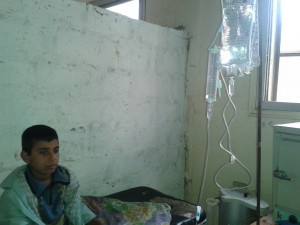Children in Deir al-Zor Hit by New Disease

Local health centre reports 50 cases of bacteremia in just one month.
Ahmad al-Bouleily
(Deir al-Zor – Syria) Doctors in the town of Deir al-Zor in eastern Syria are fighting an outbreak of bacteremia after more than 50 cases were reported at a local health centre in just one month.

Bacteremia is a disease caused by the presence of bacteria in the blood. The disease has a cure but it can be life-threatening in some cases, particularly if the patient has a weak immune system or is already sick.
Dr. Anas al-Thaher, a pediatrician at the Bouleil Health Care Centre in the eastern suburbs of Deir al-Zor, is currently treating between one and three children for the disease every day.
“Bacteria may enter the bloodstream through the respiratory or digestive systems or through the urinary tract,” he told Damascus Bureau.
“Some severe cases might lead to septicemia, or blood poisoning. This is usually the result of bacteria entering from the location of an infection, such as a lung, skin, urinary tract, or intestinal infection.”
According to al-Thaher the symptoms of bacteremia include extreme tiredness and there may be visual signs of an infection where bacteria has got into the bloodstream. Treatment usually consists of antibiotics which have to be administered by regular injections.
Some doctors attribute the spread of bacteremia to the lack of clean drinking water over the past three years as Syria has been in the grip of civil war. However there is no consensus on the primary cause of the disease.
Some have insisted that people drink sterilized water to limit the risk of infection.
However others believe that such preventive measures are fruitless as they argue that bacteremia is spread in the polluted air.
Dr. Azzam al-Hady, who works at the provincial medical offices in the suburbs of Deir al-Zor said he had also had reports of cases futher afield, in the city of al-Bseira and the village of Baqras, just under 50 kilometres from Deir al-Zor. But he said the disease had not been reported in other areas.
When Fatima Abdallah’s son contracted bacteremia she took him to the Bouleil Health Care Centre in Deir al-Zor for treatment.
“A day before going to the doctor he developed a high fever. He felt weak and lost his appetite completely,” she told Damascus Bureau.
“We didn’t know what was happening to him. His body had changed in the space of half an hour, and neither fever-reducing medications nor tranquilizers worked,” she added. “The doctor was surprised when he saw my son’s face. He asked for blood tests.”
Abdallah explained that the doctor conducted tests, including CRP, a specific type of test that identifies levels of protein in the blood. After analyzing the results, he found that Abdallah’s son had been infected by bacteria entering his bloodstream.
Doctors prescribed a course of antibiotics and Abdallah said her son’s condition has now considerably improved.
Abu Mohammad, 42, is the father of another child who contracted the disease. He said that his son got a fever and became lethargic and also lost his appetite.
“After the doctor examined him we found out that he had bacteremia,” Abu Mohammed said. “My son took all the doses prescribed by the doctor at the Health Care Centre. Five days later he was completely recovered.”
According to Dr al-Thaher, bacteremia causes white blood cells to produce more protein, which shows up in blood tests. It is possible to determine the type of bacteria present and the antibiotic needed for treatment.
“We look at the percentage of activated protein C produced by white blood cells,” al-Thaher said. “It normally ranges from 0-6 per cent. Any increase in this percentage indicates that something is wrong.”
“If there is no gastro-intestinal or respiratory infection, then we are left with two possibilities: either bacteremia or meningitis,” he added.
Since the beginning of November the health centre in Bouleil has been overrun with cases of the disease.
“We have treated more than 50 cases of bacteremia during the month of November 2014,” said Abu Saeed, the director of the health centre. “As cases of bacteremia increase, I ask everyone to help provide the injections needed to treat this condition. I also call on experts to work hard to understand the reasons behind its spread.”
The disease appears to be widespread among children but rare among the elderly.
“Most cases we received were children. We did not record a single elderly case,” said. Dr. Ammar al-Ali, a specialist in internal medicine at the Bouleil health centre.
Doctors have warned that patients must follow the full course of treatment. Not following the prescribed dosage or not completing the course of antibiotics can make the bacteria resistant to treatment.
Abdallah Younes, 25, works as a nurse at the Bouleil Health Care Centre and has followed the treatment of several patients who have been given regular intravenous medication.
“I administer them through a micro-drip at designated times,” he said. “The treatment requires a dose every six or eight hours depending on the type of antibiotics.”
